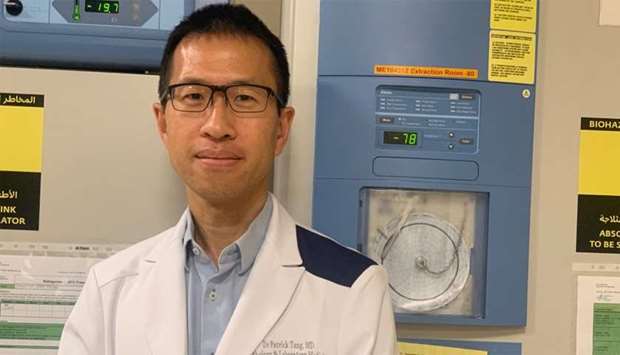Governments world over must ensure several public health measures to reduce Covid-19 transmission, even after current restrictions are lifted, a leading physician at Sidra Medicine who had played a multifaceted role during the 2003 Sars outbreak, told Gulf Times.
“Public health measures to reduce transmission must remain, even after the country has experienced the first peak of disease, or else there is a risk of a resurgence,” cautioned Dr Patrick Tang, Division Chief of Pathology Sciences at Sidra Medicine, as several countries around the world are planning to lift the restrictions that were in place for some time or may have lifted some of them.
During the 2003 Sars outbreak, Dr Tang, then based in the University of Toronto, had performed many tasks including the first laboratory tests for an unknown virus, managing infected patients and to integrating large clinical datasets to better understand the virus.
“Public health measures in a given region can only be lifted when the outbreak is under control, and there is sufficient capacity in the healthcare system to detect new infections, isolate them and quarantine their contacts as well as capacity to deal with all the individuals with serious infections. As social distancing and other measures are relaxed, it may be possible to see an increased rate of infection, but hopefully this rate is within the capacity of the public healthcare system,” explained Dr Tang.
“Even after the infections have initially peaked in a country, we are finding that there may not be enough herd immunity to prevent subsequent waves of outbreaks. That means most people in those countries are still susceptible to Covid-19,” said Dr Tang.
The expert noted that though the fatality rate from this pandemic may not be that high, its impact on the healthcare systems, economy and the society has been huge.
“This virus has shown us that, no matter how medically and technologically advanced a country may be, a lack of preparedness and the lack of a coordinated public health response can lead to devastating outcomes,” he said.
According to Dr Tang, coronaviruses are unlike the influenza virus that mutates in different ways from one year to the next.
“If we are able to vaccinate enough people in the world against Covid-19, then it is likely that this particular virus will disappear. But that just means we will be safe until the next novel coronavirus or pandemic influenza virus comes along in the future,” he said.
The physician also pointed out that the virus continues to spread in a predictable fashion all around the world.
“The pattern with which it spreads, is not necessarily a function of the virus, but a reflection of the state of the public health system in each country, and the ability of that system to quickly and effectively respond to an emerging threat,” he highlighted.
As for Covid-19 medications and vaccines, Dr Tang noted that the world has to wait for some more time.
“Covid-19 will end only with the global distribution of an effective vaccine. There are no effective treatments for it yet. All the treatments available are marginally effective at best, and the scientific evidence backing the use of these drugs is very weak. Most of the current therapies being tested are repurposing existing drugs to treat Covid-19. There are also new experimental drugs being developed but these will require many months to become available,” he added.


